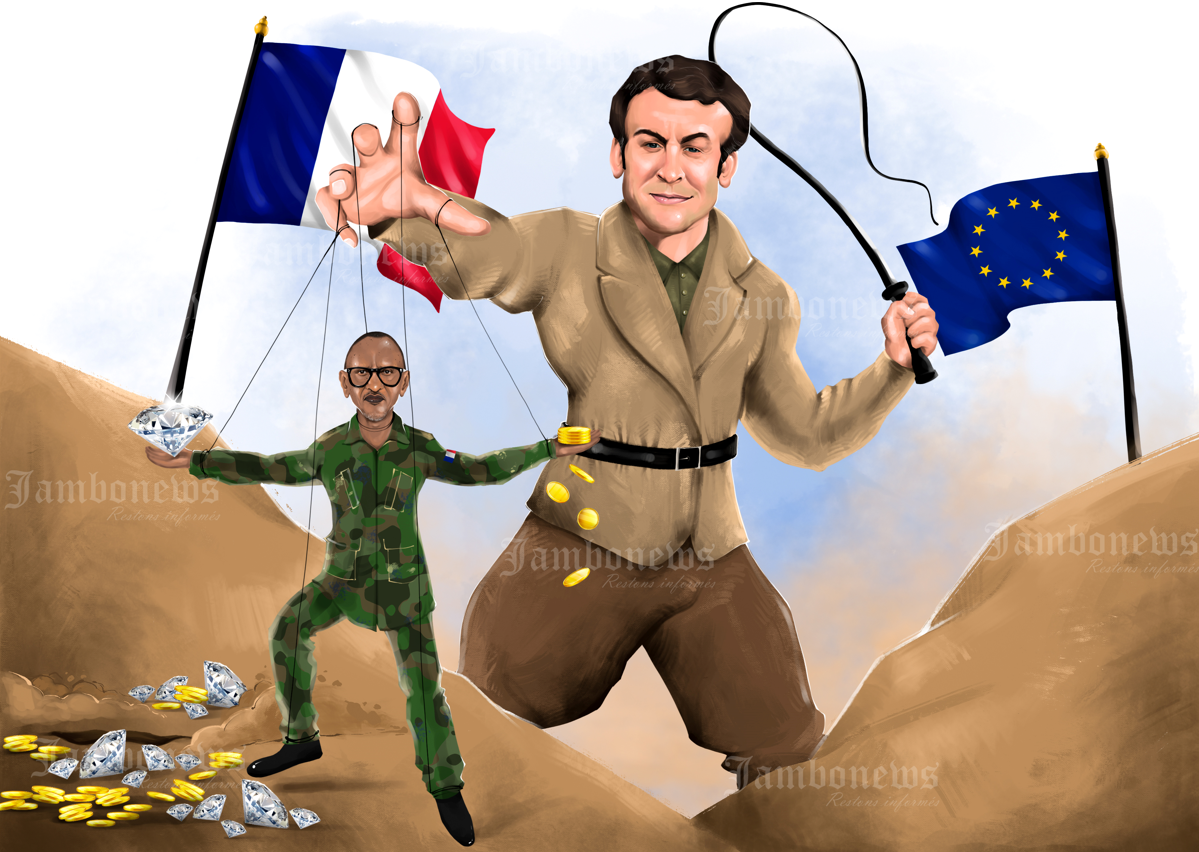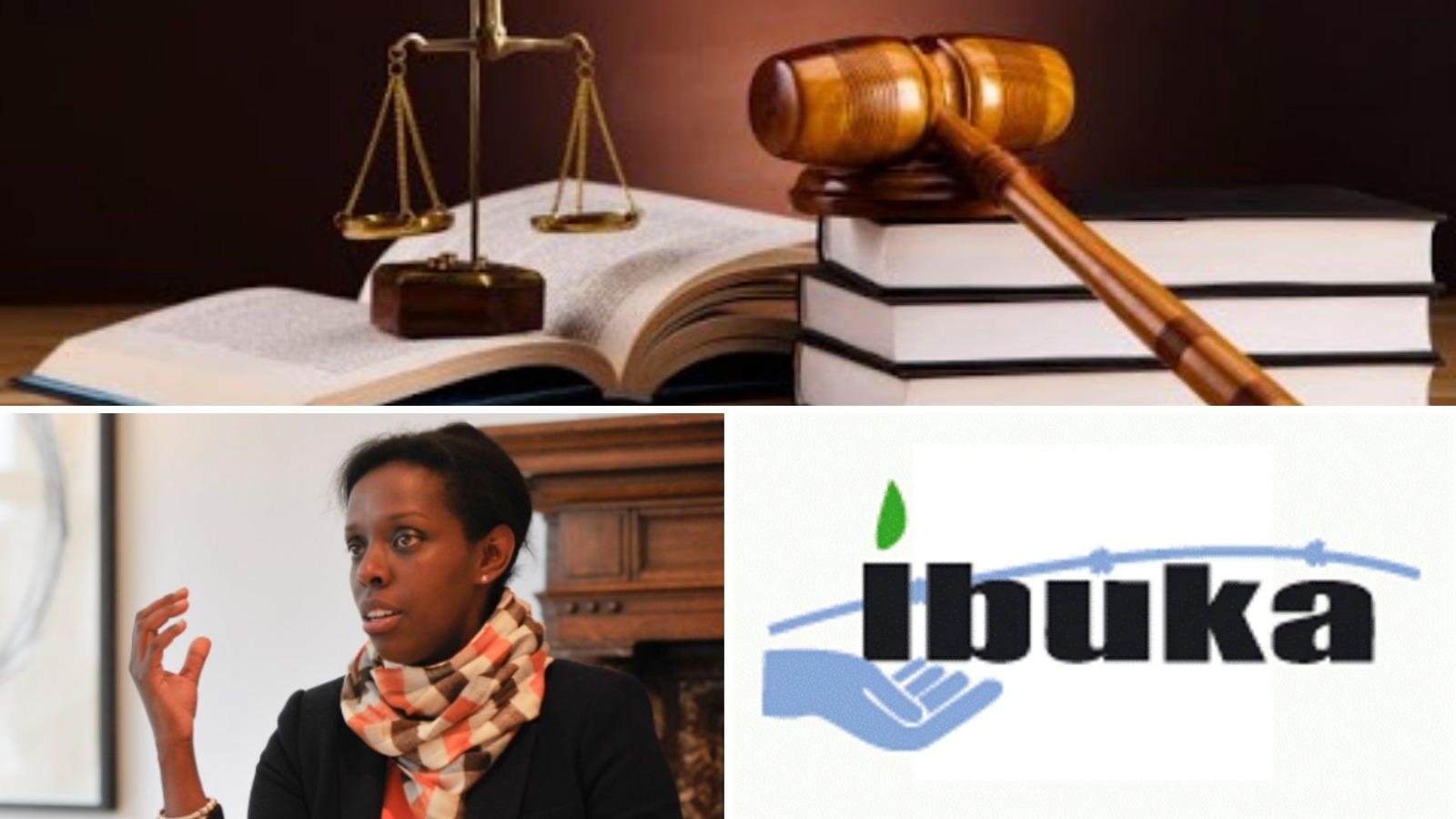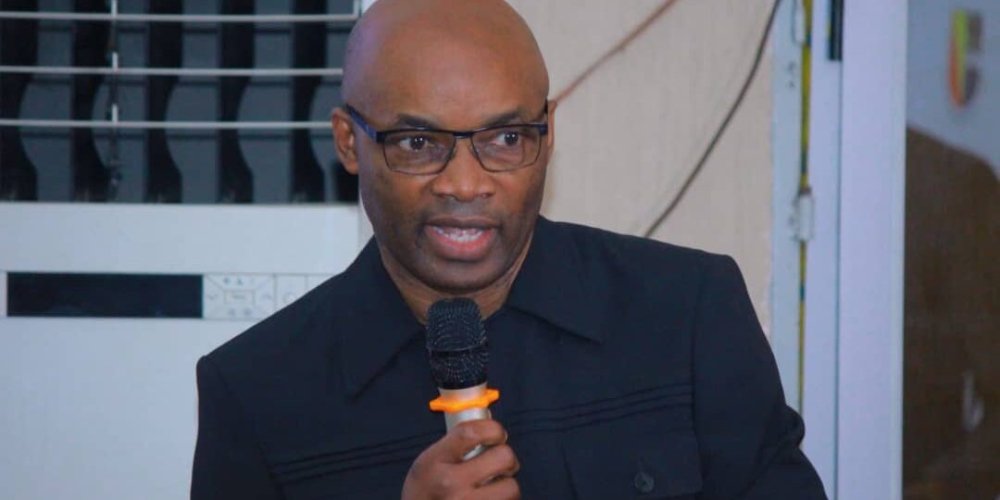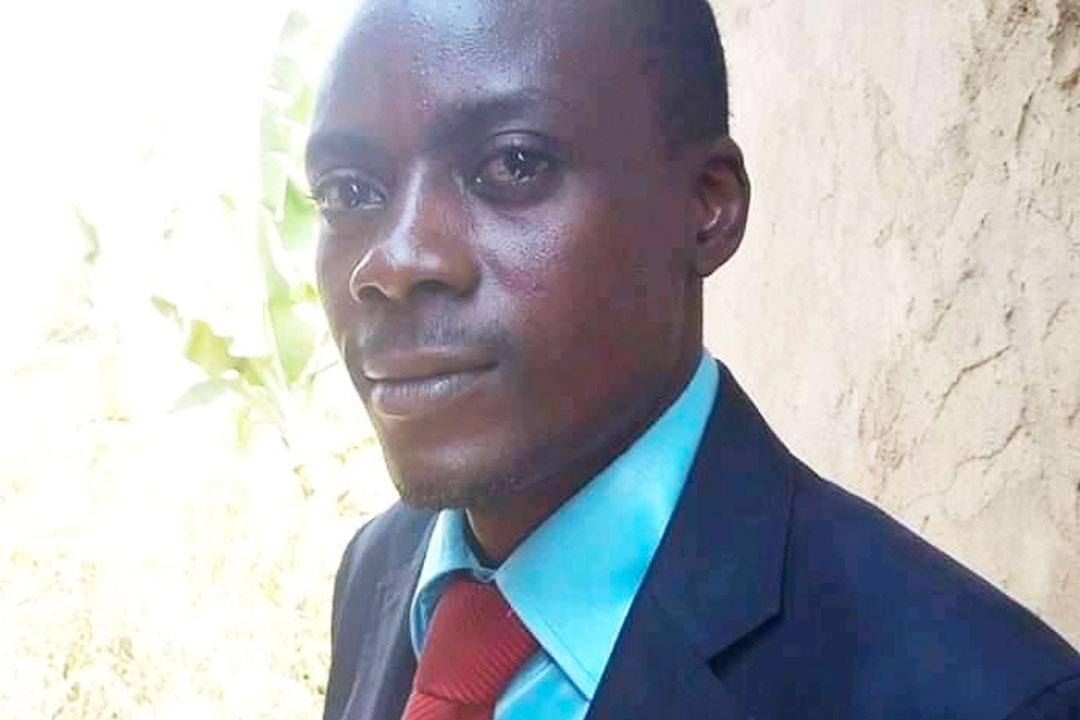Since July 2021, the Rwandan army has been deployed in Mozambique to fight an insurgency by militants linked to the Islamic State in Cabo Delgado province. Vice Admiral Hervé Bléjean, Director General of the European Union Military Staff said on Jan. 26, 2022, that Rwanda had requested “financial support through the European Peace Facility, and the High Representative is quite determined to respond favorably.”[1] The European decision to support an armed intervention in Cabo Delgado province to fight terrorism is fully justified, but what is less clear is the choice of Rwanda as a security partner. In this article we will try to analyze the context and the reasons that may lead the European institutions, under the impulse of France, to finance the Rwandan army that European External Action Service Commission accuses of “of serious human rights violations – excessive use of force, suspicious deaths in custody, extrajudicial executions and enforced disappearances.“.
The financing of this project was initiated by French President Emmanuel Macron with his European partners. In October 2011, a huge offshore gas field was discovered 40 kilometers off the northern coast of Mozambique. Eventually, these reserves, estimated at nearly 5,000 billion cubic meters, could make Mozambique the fourth largest exporter of liquefied gas in the world, and the first in Africa. TotalEnergies, the French oil company, has committed to invest $20 billion in this project, the largest private French investment ever made on the African continent. The American ExxonMobil and the Italian ENI have also invested significant sums in this project.
After yet another jihadist attack on March 24, 2021, TotalEnergies has decided to suspend the project. The French group justified the suspension by “the serious deterioration of the security situation“[2]. The Mozambican army no longer had control over most of the Cabo Delgado region, which had fallen in the hands of jihadists.
Mozambique’s President Filipe Nyusi, pushed to do something by his economic partners, mainly France, was advised to call on his Rwandan counterpart for help. He then went to Kigali on April 30, 2021, to formalize the request. Before confirming his aid, Rwandan President Paul Kagame wanted to secure European support. He visited Paris in May 2021 as part of the summit on financing African economies. On the sidelines of the summit, Paul Kagame met with Emmanuel Macron and Portuguese Prime Minister Antonio Costa to ensure that they would support the move.
Rwandan security support was quick to materialize as a first contingent of 1,000 soldiers and police arrived in Mozambique in early July 2021. Since then, Rwandan troops have been fighting alongside the Mozambican army and a multilateral force of SADEC countries.
France bogged down on the African soil
France, although directly affected by this insurgency, has not chosen to send its troops directly to fight the jihadist threat in Cabo Delgado. The reason for this is that French troops are bogged down in a war against terrorism in the Sahel that is turning into a quagmire and risks ending in disaster, since the Sahelian populations are so disappointed by nine years of war that they feel have not produced any convincing results. Moreover, the last French operations, such as those in Côte d’Ivoire, the Central African Republic or Libya, ended with a strongly smeared image of France.
African populations accuse France of a “two-faced neo-colonialist” attitude. They accuse France of advocating, on the one hand, human rights, and democracy, but on the other, of supporting ruling autocrats and seeking to protect its interests by all means. West African youth, weary but aware, have preferred in recent years to support military coups (in Mali, Guinea, and Burkina Faso) and cooperation with an equally pragmatic but less cynical Russia, rather than France, the historical partner. For all these reasons, French authorities are less and less inclined to send their troops to fight in Africa.
Kagame’s security diplomacy strategy pays off
This observation made by the French authorities partly justified the Elysée’s desire to reconcile with Rwanda. Indeed, Rwanda has made its army the engine of its diplomacy for the past 20 years. As the fourth largest contributor to UN peacekeeping forces and the first in terms of ratio per population[3], Rwanda’s voluntarism in terms of security pleases New York. Rwanda has succeeded in building a significant influence within the international institution, notably and above all thanks to its large contingents within UN peacekeeping operations. The United States, very receptive to this, has long made Kagame its protégé. However, this voluntarism is not disinterested. In 2022 the United Nations will pay Rwanda 171 million dollars[4] in reimbursement for the costs of peacekeeping operations in various countries.
This financial manna and this experience have allowed President Paul Kagame to build an army that is now considered one of the most professional, trained and equipped on the African continent.
The good reputation enjoyed by the Rwandan army has gradually led Kigali to evolve its model from multilateral security contribution to bilateral security collaboration. The first experience of bilateral engagement was in the Central African Republic (CAR), where since December 2020[5],[6], Rwanda has deployed its special forces to rescue Central African President Faustin-Archange Touadéra from rebels, threatening his power just a few kilometers from the capital Bangui.
Again, this is not disinterested, as Rwanda is paid through generous trade agreements that allow it to get its hands on part of the country’s immense mining wealth. [7]
Paris chooses Kagame to ensure its interests in the Central African Republic
This increased commitment of Rwanda in CAR was supported by France and Europe. The Central African Republic is one of the former colonies in which Paris has always wanted to maintain its influence at all costs. However, in 2016, François Hollande decided to conclude Operation Sangaris, which French forces had been conducting in CAR since 2013. France had then, against all odds, withdrawn her troops from the Central African Republic the day after the inauguration of the new president Faustin-Archange Touadéra, even though the security situation remained worrying.
This was a blessing (boon) for Russia and especially for their paramilitary militia Wagner. The new Central African Head of state, seeking international support, turned to the Russians, who responded favorably and quickly became the new masters of Bangui. The Russian militia took advantage of its position of strength to also get its hands on a significant part of the Central[8] African Republic’s immense mineral reserves.
Paris, feeling offended for being dislodged from its Central African reserved territory, decided to react. One of the important decisions taken by France was to approach Rwanda (Kigali). Indeed, since 2014, the UN has launched a peacekeeping mission in the Central African Republic (MINUSCA) in which Rwanda has been involved since its launch. In the absence of a credible Central African army, Rwanda, which makes up the bulk of MINUSCA[9]‘s troops, has quickly become the second most influential country on the Central African terrain behind Russia.
Since its withdrawal from CAR, France has initiated all draft resolutions at the Security Council aimed at supporting MINUSCA against the advice of Russia[10], which has repeatedly used its veto power. Rwanda’s decision in 2020 to increase its troops in CAR via a bilateral agreement, bypassing the UN’s right of oversight, was viewed favorably in Paris.
Paris’ strategy of supporting increased Rwandan involvement in CAR was justified on the one hand to ensure that its residual interests would be safeguarded, and on the other hand to use Rwanda as a counterweight to prevent Russians monopolizing wealth and influence in the CAR. Since then, Rwanda has acted as a kind of French proxy in the Central African Republic.
This tacit support, Paris also wanted European Union to endorse it. African Intelligence[11], a media outlet specializing in African political and economic news, recently revealed that the European Union was considering putting the training of Central African forces under the European military training mission under Rwandan supervision, to ensure that they no longer act alongside Wagner’s paramilitary forces.
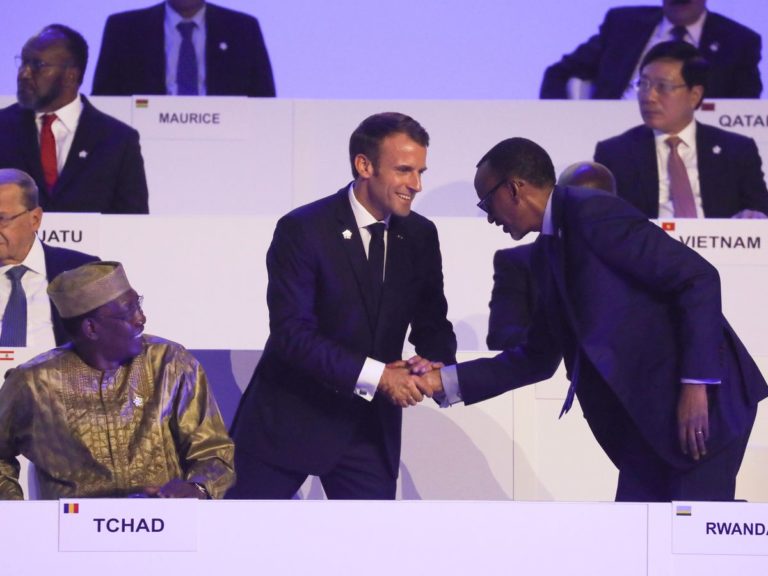
A reconciliation at all costs
With on one hand a global power losing ground in Africa and on the other a small state with growing ambitions, the meeting of the mind was inevitable. The interests of France and Rwanda were aligned. There was still one thorn in the side of the partnership: the historical reading of France’s action during the genocide in Rwanda. On the one hand, President Paul Kagame accused Paris of having played “a direct role in the political preparation of and participation in the genocide. On the other hand, French justice accused people close to Kagame of having shot down the plane of President Juvénal Habyarimana, which was the trigger of the genocide.
Faced with this tense situation, the two heads of state have nevertheless managed to completely turn things around in the space of 4 years and in 4 acts.
First, in 2018, French President Macron offered Louise Mushikiwabo, Paul Kagame’s Foreign Minister, the position of Secretary General of the International Organization of La Francophonie. A decision that totally surprised the general opinion because at the time France and Rwanda had, at least officially, stalled diplomatic relations. Moreover, Rwanda had abandoned the French language (of Molière) for English (that of Shakespeare) and had joined the Commonwealth.
Second, France decided to drop the charges against the nine people close to Paul Kagame accused of ordering and participating in the attack on Juvenal Habyarimana’s plane in April 1994. After an investigation that lasted 20 years, during which many of the prosecution witnesses disappeared or were murdered, Paris closed the case without further action. This case, which had caused the ire and concern of the Kagame clan for 20 years, had a happy ending for Kagame and his family.
Third, the storytelling and media narrative on Rwanda in France has been completely reversed. While France was one of the most critical countries on human rights violations in Rwanda, Kagame was gradually presented as a visionary, enlightened head of state who would have pacified and developed Rwanda.
Finally, fourth, both countries published two similar reports (the Duclert Report on the French side and the Muse Report on the Rwandan side) criticizing French policy in Rwanda in the 1990s but exonerating France of any guilt. In this way, Presidents Macron and Kagame tacitly agreed that the past and the search for historical truth should in no way interfere with or influence future[12] commercial, diplomatic, and especially security collaboration. This approach has been much talked about because it is considered cynical by many researchers, journalists, and survivors of the genocide[13].
After these formalities, Emmanuel Macron went to Rwanda in May 2021 to formalize the reconciliation and partnership between France and Rwanda, signing in passing a commitment to release 500 million euros over 4 years to support the Rwandan[14] government. This should place France in the top Rwandan 3 contributor countries in terms of official development assistance, whereas it was previously below (beyond) the tenth place.
Paul Kagame is rubbing his hands together. While his relationship with the United States and the United Kingdom, which were his original supporters, has been on the wane for several years and has even worsened with the kidnapping and imprisonment of Paul Rusesabagina, he has found in France, the international sponsor he needs to continue his work.
Has the Rwandan army become the French Wagner?
France now must deal with Russian competition to increase its influence in Africa. A competition that could almost be described as unfair because most of the time the Kremlin hides behind the paramilitary mercenary group Wagner to act in an unofficial way.
The mercenaries of the Wagner Group have been deployed in Africa, including Sudan, Central African Republic, Libya, Madagascar, Mozambique and recently in Mali. The use of Wagner Group exonerates the Russian president Vladimir Putin when things go wrong. He does not have to account for failures, exactions or looting by members of this group but gets the credit when things go well.
It seems that Emmanuel Macron has been inspired by his Russian counterpart. By enlisting the services of Kagame and the Rwandan army, the French president has secured the services of seasoned troops that can be deployed in abundance on the African continent. Above all, he thinks he can avoid the frequent criticism of France’s neo-colonialist image. Moreover, if the operation is a failure, he will not take responsibility for the consequences in front of a very critical French public opinion that is less and less inclined to accept the deaths of young French soldiers thousands of kilometers away from France. For his part, Paul Kagame has secured in France a powerful sponsor, one of the two pillars of Europe and a permanent member of the Security Council.
Moreover, for Paris, the Rwandan army is the perfect alternative to offer to African states that experience security problems and were considering going for the Russian Wagner Group. The Rwandan option has the advantage that it allows African Heads of State to reassure their population that the Rwandans are Africans like themselves.
When asked why Rwanda decided to send its troops to fight for Mozambique, Paul Kagame brought his “pan-Africanism” out of the closet and lyrically replied: “Africans are capable and can find solutions to their most difficult problems. Nothing should prevent us from ensuring the stability, progress, and well-being of the African people. That is why Rwanda did not hesitate, when we were asked to join our armed forces with the Mozambican forces, to bring security to this region.”[15]
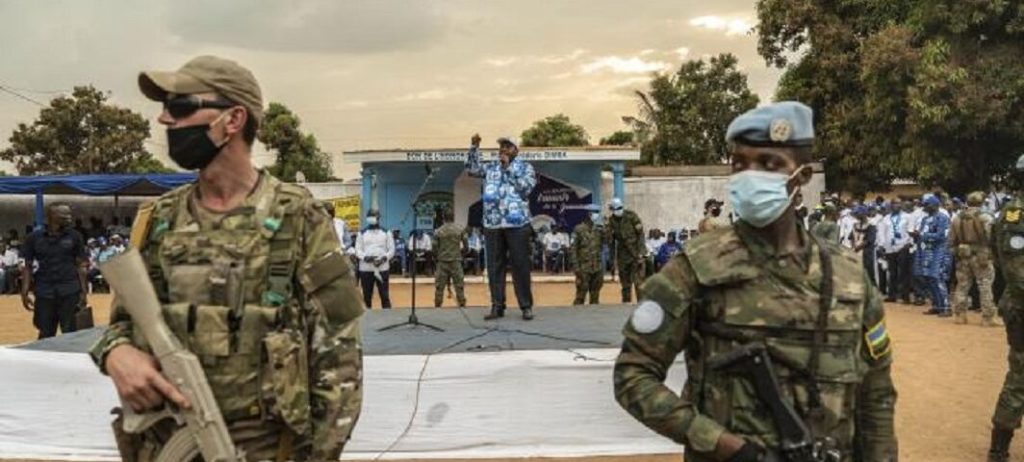
Wagner-Rwanda: Is it “a six of one and half a dozen of the other”?
At first glance, comparing a regular army and a mercenary army may seem incongruous. Yet the parallel is quite striking. The methodologies, objectives and fields of action are very similar between the Rwandan army and Wagner.
The two armies, which are generally present in the same African areas of operation, have been crossing paths. In the CAR, they are both in place to protect the ruling power. In Mozambique, Wagner gave way to the Rwandan army after a presence between 2019 and 2021. Russian mercenaries had been contracted by the Mozambican government to solve the jihadist problem in Cabo Delgado province, with little success in the end. Finally, both armies are now looking at Mali.
Following the more than likely departure of French forces from Mali, Wagner reportedly began deploying troops to the Sahel. On the Rwandan side, Rwandan Army Chief of Staff Jean-Bosco Kazura visited Bamako in October 2020[16]. There he met with Malian Army Chief Oumar Diarra and Defense Minister Sadio Camara. He offered them bilateral security cooperation. As in the CAR, the Elysée would welcome such an intervention, which has poor relations with the Malian junta because of the rapprochement between Bamako and Moscow.
Whether in CAR, Mozambique, or the Sahel, neither Rwanda nor Wagner have vital or particular interests that could justify armed intervention beforehand. What they do have in common is that they are acting on behalf of powers that have important geopolitical or economic ambitions.
In addition, Wagner and Rwanda share a partly similar compensation methodology. It comes out clearly that the countries in which the two armies are deployed have large mineral reserves, particularly gold. Indeed, Wagner and Rwanda systematically enter into agreements for mining to secure direct remuneration.
Who will pay the Mozambican bill?
The advantage of a regular army over a mercenary army is that it can apply for more institutional sources of funding. The cost of the Rwandan operation in Mozambique is estimated at $20 million per month[17], and the Rwandan state clearly does not have the means to meet these expenses over the long term.
Indeed, despite its very positive image in the media, Rwanda remains an underdeveloped country and one of the 25 poorest countries in the world, with a nominal GDP that places Rwanda in the 149th in world ranking [18], behind countries like South Sudan or Haiti.
Paris has then set out to find institutional sources of funding for its new ally, and it was to the European Union that Emmanuel Macron’s eyes turned. The media outlet African Intelligence[19] has revealed that Paris is said to have solicited the support of several European capitals to support the financing of the Rwandan operation in Mozambique via the European Peace Facility mechanism. This is an extra-budgetary fund of 5 billion euros over 7 years intended to finance peacekeeping operations as well as programs to strengthen armies. Since September 2021, the European Union has been working on the modalities of this direct financial support to the Rwandan army.
The declarations of French Vice-Admiral Hervé Bléjean, making this financing project official for the first time, crowns the work of persuasion of French diplomacy, which is on the way to convincing its European partners to finance its Rwandan ally. However, despite nearly six months of discussions, the member countries’ violins are not completely in agreement on this issue. Some countries have doubts about the level of funding, which is perceived as too high, while others have doubts about the ethics.
French oil giant TotalEnergies has already put its hand in its pocket. Patrick Pouyané, CEO of the French “supermajor” stopped in Kigali on January 30, 2022, before heading to Mozambique. According to African Intelligence[20], the French executive wanted to ensure Rwandan commitment to Mozambique in the long term. The oil group hopes to be able to relaunch its operations (activity) at the Cabo Delgado gas site during 2022. On the sidelines of the meeting with President Kagame, Patrick Pouyané signed a memorandum of understanding with the Rwandan government on the marketing and supply of energy to Rwanda and announced the creation of a subsidiary with a permanent office in Kigali.
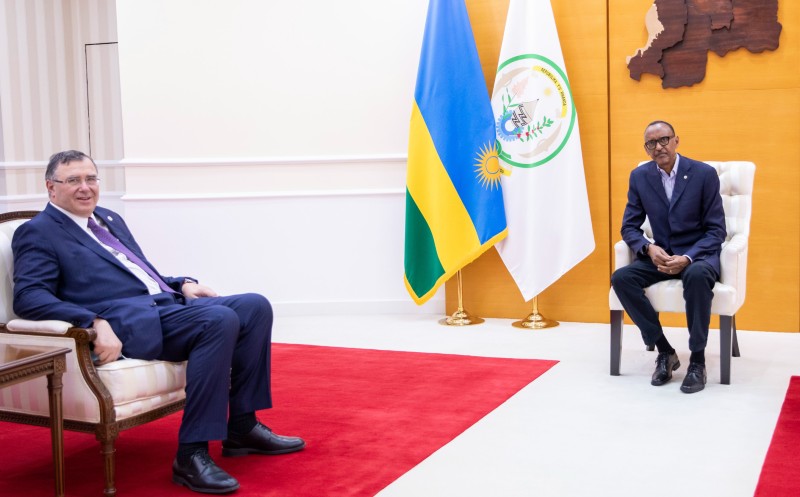
By allying himself with Kagame, Macron accelerates the French decline
Emmanuel Macron’s mistake in allying himself with Paul Kagame is to think that such a partner will help him reclaim that Africa which is slipping further and further away from France. If indeed an army like Kagame’s can help protect a juicy business contract in the short term. In the long term, such an ally tarnishes an image and reveals true intentions that can only be perceived as individualistic. What President Macron gains today, he will lose for France tomorrow.
France is mistaken when it thinks that in order to fight against China, Turkey or Russia on the African market, it must use the same weapons as these countries. The difference is that the expectations of the African people for “the country of human rights” cannot be the same as for others. France has never been so popular and prosperous in Africa as when it has put the interests of the people first in a win-win relationship.
Today, Macron’s power has very tense relations with several countries that historically have strong relations with France (Algeria, Mali, Guinea, Burkina Faso, etc.). The French political and media class seems flabbergasted by these countries that no longer hesitate to engage in power relations with Paris. But is this really a surprise? What message is President Macron sending to the authoritarian regimes in power in Africa when he is now rolling out the red carpet to a president who has spent 20 years insulting France, accusing it of all evils and mocking its successive heads of state?
When it comes to assessing President Macron’s African diplomatic policy, one can clearly say that there has been a lot of voluntarism, but that this has been accompanied by a harshness, an arrogance, an incoherence and a loneliness that have done damage. Macron wanted to embody pragmatism, but Africa felt it as a desire to guarantee its interest at all costs.
The famous “at the same time” dear to Emmanuel Macron also applied to his action in Africa. The French President has distinguished himself by a lack of backbone and diplomatic coherence that calls into question. On the one hand, he denounced “intolerable human rights violations” in Cameroon, created a fund for democracy in Africa or denounced the “double coup” of the Malian junta. But on the other hand, he goes to Chad to give his blessing to institutionalized nepotism, sells arms to the increasingly repressive Egyptian government and forges a military alliance with President Kagame, whose army is accused of the worst abuses in the DRC in the last 25 years.
Emmanuel Macron wanted to assume a strategy of realpolitik, but realpolitik is a diplomatic art and a balancing act that cannot be improvised or applied hastily at the risk of losing the hoped-for gains and the initial stake. President Macron gives the impression of having favored a policy of blows, case by case, to the detriment of a long-term, global and coherent vision.
The EU’s double discourse on human rights
Under the impetus of France and long-time supporters such as Charles Michel, the President of the European Council, Europe is likely to follow in France’s footsteps by choosing to support the Rwandan army financially and diplomatically. However, The Rwandan regime is a debatable power. Hailed by many for its economic progress, it is also strongly criticized for its human rights violations. On the issue of European funding, many voices have been raised to denounce the inconsistency of the European institutions and the EU’s double talk when it comes to Rwanda.
Indeed, on the one hand, the European Parliament asked the Commission, in a resolution dated October 2021 on the case of Paul Rusesabagina, to “critically re-examine the aid provided by the European Union to the Rwandan government and public institutions to ensure that it fully promotes human rights. On the other hand, the Commission is ignoring these recommendations by unreservedly supporting financial support to the Rwandan army through the European Peace Facility mechanism, which it manages. Today, Paul Rusesabagina, the hero of the film Hotel Rwanda, is still languishing in Rwandan jails, and his family is still waiting for concrete action from the European authorities. In any case, this betrays an inconsistency between the Parliament’s request and the Commission’s action.
Rwanda is a signatory to the Cotonou Agreement, which states that respect for human rights is an essential component of cooperation between the European Union and the Organization of ACP States. The agreement also stipulates that the consolidation of the rule of law and the strengthening of human rights are the main priorities of the European Union’s programming towards signatory countries like Rwanda. However, based on the conclusions[21] of all the multilateral and non-governmental organizations that have analyzed Rwanda’s human rights record, one can easily conclude that the human rights situation in Rwanda is alarming. There is clearly an incoherence regarding the treaties that set out the framework of cooperation between the European institutions and the African countries.
Finally, in the latest European External Action Service (EEAS) report on human rights in Rwanda dated June 2021, the European body observes (expresses itself) that the Rwandan government “continues to be the subject of allegations of serious human rights violations – excessive use of force, suspicious deaths in custody, extrajudicial executions and enforced disappearances.” All these abuses are committed by the same security forces, police, and military, that the European Commission wishes to support financially. There is again an inconsistency between what the Commission denounces and what it intends to finance.
This generalized lack of coherence, which gives the impression of double talk, is a recurring criticism of Brussels. More and more voices are being raised against a European policy that is guided solely by interests to the detriment of the people and the values that Europe claims to defend.
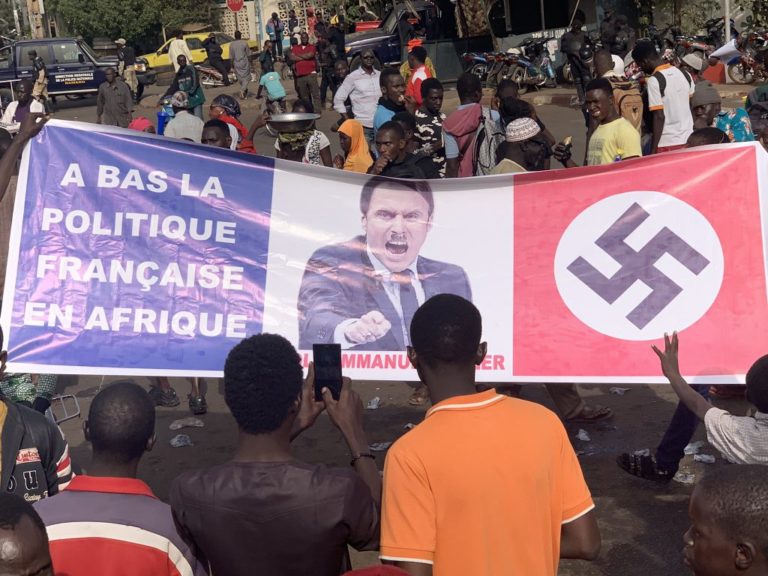
Europe must learn from the past and avoid France’s mistakes in Africa
Europe is in danger of getting its wings burnt by trying to support Macron’s strategy of a security alliance with Kagame in Africa. If the fight against terrorism and jihadism is a necessity, the way in which it is carried out is also important. Using a proxy does not protect against backlash. Today no one is fooled by the fact that the Wagner Group is acting on behalf of the Kremlin in Africa. Just as no one is fooled by the fact that the Rwandan army is acting partly on behalf of the Elysée in Africa.
It is essential for Europe to learn the lessons from the popularity of the military coup d’état phenomena in West Africa in recent years. Two are particularly important when it comes to Rwanda: first, they reveal a strong aspiration of the African people and youth for a rule of law that provides security while ensuring democracy and freedom. Secondly, they betray an absolute rejection of France, which is perceived as a power with double standards that seeks only her own interests.
Even if the Rwandan government is structurally different from the West African countries, the aspirations and feelings of the people are similar. An ill-considered support to the Rwandan government would only add fuel to the fire of the detractors of the EU’s policy, which they consider incoherent, and would reinforce the rejection of African youth in the face of a policy they consider neo-colonialist. If the European Union does not review the conditions of its security collaboration with the Rwandan government, this time it may (will) no longer be French flags that will be burned as is currently the case in the Sahel but could rather be European flags.
Norman Ishimwe SINAMENYE
[1] https://multimedia.europarl.europa.eu/webstreaming/subcommittee-on-security-and-defence_20220126-1345-COMMITTEE-SEDE
[2] https://www.france24.com/fr/%C3%A9co-tech/20210426-mozambique-total-suspend-son-projet-gazier-pour-cause-de-force-majeure
[3] https://peacekeeping.un.org/en/troop-and-police-contributors
[4] https://cddmoz.org/wp-content/uploads/2021/11/Is-France-using-development-aid-to-finance-the-intervention-of-Rwandan-troops-in-Mozambique.pdf
[5] https://information.tv5monde.com/afrique/centrafrique-le-gouvernement-annonce-que-le-rwanda-et-la-russie-ont-envoye-des-soldats
[6] https://www.africaintelligence.fr/afrique-ouest-et-centrale_diplomatie/2021/04/07/paul-kagame-business-angel-de-touadera,109655531-eve
[7] https://www.africaintelligence.fr/afrique-ouest-et-centrale_diplomatie/2021/04/07/paul-kagame-business-angel-de-Touadéra,109655531-eve
[8] https://www.lemonde.fr/afrique/article/2021/12/14/exactions-et-predations-la-methode-de-la-milice-wagner-en-afrique_6105992_3212.html
[9] https://peacekeeping.un.org/fr/mission/minusca
[10] https://nemrod-ecds.com/?p=2948
[11] https://www.africaintelligence.fr/afrique-ouest-et-centrale_diplomatie/2022/01/03/les-soldats-rwandais-vont-ils-encadrer-les-contingents-formes-par-la-mission-militaire-de-l-ue,109713690-art
[12] http://www.echosdafrique.com/wp-content/uploads/2021/05/Rapport-Duclert-_-Une-analyse-et-des-conclusions-discutables.pdf
[13] https://www.jeuneafrique.com/1160161/politique/analyse-role-de-la-france-au-rwanda-la-realpolitik-au-detriment-de-lhistoire/
[14] https://www.jeuneafrique.com/1179992/economie/macron-au-rwanda-la-france-va-debloquer-plus-de-350-millions-deuros/
[15] https://www.youtube.com/watch?v=VXX6B_4uffc
[16] https://www.africaintelligence.fr/afrique-est-et-australe_diplomatie/2021/12/10/comment-kigali-exporte-son-savoir-faire-militaire-sur-le-continent,109709922-ar2
[17] https://www.africaintelligence.fr/petrole-et-gaz_exploration-production/2022/01/24/cabo-delgado–le-yalta-diplomatico-petrolier-de-patrick-pouyanne-et-paul-kagame,109718057-art
[18] https://tinyurl.com/49cmr9me
[19] https://www.africaintelligence.fr/afrique-est-et-australe_diplomatie/2021/11/08/l-union-europeenne-va-t-elle-financer-le-deploiement-des-soldats-rwandais,109702788-art
[20] https://www.africaintelligence.com/oil–gas_exploration-production/2022/01/24/pouyanne-and-kagame-s-diplomatic-dance-to-restart-cabo-delgado-lng,109718558-eve
- [21] UPR Review 2021, HRW report 2022, Freedom House report 2021, RSF report 2021, US state dept. Human Rights report 2021, American Bar Association – Center of Human rights report 2021…

